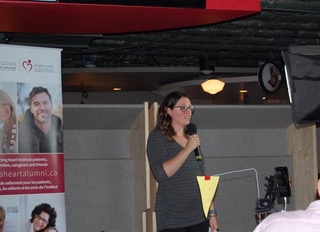Meet the Expert: Caring for the Caregiver
On September 12th, the UOHI Patient Alumni hosted another successful Meet the Expert event at the Fieldhouse restaurant at the RA Centre. Caregivers – whether a spouse, family member or friend – play a critical role in the recovery process. Participants confirmed that caring for a loved one is an important role – being there to physically, emotionally and financially support a loved one; being a second set of ears at medical appointments; making meals; and so much more. There can also be costs – fatigue, loss of independence, difficult communications with their loved one. This event focused on how caregivers can care for their loved one while making the space to care for themselves. It is only by caring for ourselves that we have the strength to care for others.
A number of resources were shared with participants. All are or will become available online and some paper copy versions can be found at the Heart Institute.
- Ten tips for Emotional Health: https://www.ottawaheart.ca/the-beat/2016/06/24/10-tips-emotional-health
- Caregiver Self Assessment Questionnaire (available in EN only): http://www.caregiverslibrary.org/Portals/0/CaringforYourself_CaregiverSelfAssessmentQuestionaire.pdf
- Cardiac Prevention and Rehabilitation Calendar of Events which gives you times and dates of classes being run at the Heart Institute: https://www.ottawaheart.ca/calendar
- Healing Hearts Together is a new program for couples that is being started at the Heart Institute. They are actively recruiting for this program. https://ottawaheartalumni.ca/index.php/en/heart-disease-and-relationships/ Contact the research coordinator at 613 696 7000 ext 15406 or email couples@ottawaheart.ca for more information.
- The Heart Institute will pilot a Stress Management class for caregivers starting in January. This 6-week program will run from January 14 to February 18, 2020 from 12-1:30 on Tuesdays at the Heart Institute. At least 8 people registered to participate will be needed to run the program. Those interested can contact Esther Doucette at: edoucette@ottawaheart.ca
- A list of resources that will be available once the Caregiver Guide is published in the next few months. Until the Guide is available, you can find Caregiver Resources on the Heart Institute website: https://www.ottawaheart.ca/patients-visitors/tools-resources/caregiver-resources
Dr. Karen Bouchard, Postdoctoral Fellow in Behavioural Medicine and Health Psychology, kicked off the panel by sharing insights from her research work on caregiving. The importance of the role of caregivers is being recognized in the research. In one study, caregivers unpaid labour has been valued at $26 billion per year. 30% of people in Ontario report being a caregiver. And, interestingly, while many believe that caregivers are primarily female, research has shown that just over half (55%) of caregivers are women. The experience of caregiving – if you are caring for a spouse, if you are a single adult child caring for a parent, if you are one of many siblings caring for a parent — it is not a one size fits all. Consistently, what is critical to successfully managing the caregiving role is social support, building relationships and asking for help. To that end, the Heart Institute is developing the Caregiver Guide (which will provide caregivers with information about resources and tools) and is including caregivers in prevention programs offered by Cardiac Prevention and Rehabilitation. A new program is being developed called Healing Hearts Together. Please contact the research coordinator at 613 696 7000 ext 15406 or email couples@ottawaheart.ca for more information.

Esther Doucette is a social worker with Cardiac Prevention and Rehabilitation. She suggested caregivers should be looking out for two experiences: compassion fatigue and post-traumatic stress disorder. Both of these can have important negative health impacts on caregivers if they go unaddressed. She reminded us that good communication – with your medical team, your partner, with extended family and friends – is essential to healthy outcomes. Don’t assume you need to be everything to your partner. Allow your loved one to have some space. Caregiving can be an emotional roller coaster. It is important to take that time to take care of yourself: find someone you can talk openly to about what you are experiencing; get enough sleep; move your body; find some quiet time; engage in a spiritual practice — find something that is important and meaningful to you. The Heart Institute offers programs open to caregivers on managing stress. Check the online calendar for times.

Gloria shared her personal story about her husband’s heart attack. She was present when her husband experienced a heart event. Gloria was a strong advocate for her husband – was paying attention to every detail that would help keep her husband alive. Because of this focus, she put her own emotions aside because she needed to be there for her husband – to learn, to try to understand. They knew there would be challenges coming but had no idea how many. They went through a lot of emotional trauma and weren’t prepared for the impact this would have on his mental health. After the cardiac event, they were focused on the physical recovery. They took as many programs at the Heart Institute as they could. It was tough because sometimes they felt a little out of place. It has been a long road and they have appreciated all the support the Heart Institute has been able to provide.

The panelists were followed by an engaging question and answer period.

You can view the event via Facebook using the following link:
https://www.facebook.com/uohipatientalumni/videos/499852814167101/
